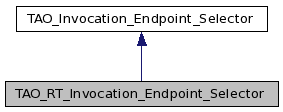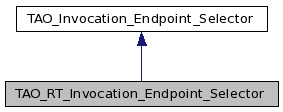TAO_RT_Invocation_Endpoint_Selector. More...
#include <RT_Invocation_Endpoint_Selectors.h>


Public Member Functions | |
| virtual void | select_endpoint (TAO::Profile_Transport_Resolver *r, ACE_Time_Value *val) |
Select the endpoint and set r's profile_. | |
Protected Member Functions | |
| void | select_endpoint_based_on_client_protocol_policy (TAO::Profile_Transport_Resolver &r, RTCORBA::ClientProtocolPolicy_ptr client_protocol_policy, RTCORBA::ProtocolList &protocols, ACE_Time_Value *val) |
| int | endpoint_from_profile (TAO::Profile_Transport_Resolver &r, ACE_Time_Value *v) |
TAO_RT_Invocation_Endpoint_Selector.
This strategy is used when the only policy that might be set is the private connection policy.
Definition at line 47 of file RT_Invocation_Endpoint_Selectors.h.
| int TAO_RT_Invocation_Endpoint_Selector::endpoint_from_profile | ( | TAO::Profile_Transport_Resolver & | r, | |
| ACE_Time_Value * | v | |||
| ) | [protected] |
Definition at line 147 of file RT_Invocation_Endpoint_Selectors.cpp.
{
// Narrow to the RT Stub.
TAO_RT_Stub *rt_stub = dynamic_cast <TAO_RT_Stub *> (r.stub ());
if (!rt_stub)
throw CORBA::INTERNAL ();
// Get the priority model policy.
CORBA::Policy_var priority_model_policy =
rt_stub->get_cached_policy (TAO_CACHED_POLICY_PRIORITY_MODEL);
// Get the bands policy.
CORBA::Policy_var bands_policy =
TAO_RT_Endpoint_Utils::policy (
TAO_CACHED_POLICY_RT_PRIORITY_BANDED_CONNECTION, r);
bool all_endpoints_are_valid = false;
bool match_priority = false;
bool match_bands = false;
CORBA::Short client_thread_priority = 0;
CORBA::Short min_priority = 0;
CORBA::Short max_priority = 0;
// If the priority model policy is not set.
if (CORBA::is_nil (priority_model_policy.in ()))
{
// Bands without priority model do not make sense.
if (!CORBA::is_nil (bands_policy.in ()))
{
CORBA::PolicyList *p = r.inconsistent_policies ();
if (p)
{
p->length (1);
(*p)[0u] = CORBA::Policy::_duplicate (bands_policy.in ());
}
// Indicate error.
throw ::CORBA::INV_POLICY ();
}
// No priority model policy (and no bands policy): all endpoints
// are fair game.
all_endpoints_are_valid = true;
}
// If the priority model policy is set.
else
{
// Get the protocol hooks.
TAO_Protocols_Hooks *protocol_hooks =
r.stub ()->orb_core ()->get_protocols_hooks ();
if (protocol_hooks != 0)
{
CORBA::Short server_priority = 0;
CORBA::Boolean is_client_propagated = false;
// Check the priority model policy to see if it is client
// propagated.
protocol_hooks->get_selector_hook (priority_model_policy.in (),
is_client_propagated,
server_priority);
if (!is_client_propagated)
{
// Server declared: all endpoints are fair game.
all_endpoints_are_valid = true;
}
// Client propagated.
else
{
// Get client thread priority from 'Current' or if not set by implying one
// from the native thread priority via the mapping.
if (protocol_hooks->get_thread_CORBA_priority (client_thread_priority) != -1 ||
protocol_hooks->get_thread_implicit_CORBA_priority (client_thread_priority) != -1)
{
// OK
}
else
{
if (TAO_debug_level > 0)
ACE_DEBUG ((LM_DEBUG, "ERROR: TAO_RT_Invocation_Endpoint_Selector::endpoint_from_profile. "
"Unable to access RT CORBA Priority in client thread "
"accessing object with CLIENT_PROPAGATED priority model.\n"));
throw CORBA::DATA_CONVERSION (CORBA::OMGVMCID | 2, CORBA::COMPLETED_NO);
}
// If there are no bands.
if (bands_policy.ptr () == 0)
{
// Match the priority of the client thread with the
// endpoint.
match_priority = true;
}
// There are bands.
else
{
// Check which band range we fall in.
bool in_range = false;
protocol_hooks->get_selector_bands_policy_hook (
bands_policy.in (),
client_thread_priority,
min_priority,
max_priority,
in_range);
// If priority doesn't fall into any of the bands.
if (!in_range)
{
CORBA::PolicyList *p = r.inconsistent_policies ();
if (p)
{
p->length (2);
(*p)[0u] = CORBA::Policy::_duplicate (bands_policy.in ());
(*p)[1u] =
CORBA::Policy::_duplicate (
priority_model_policy.in ());
}
// Indicate error.
throw ::CORBA::INV_POLICY ();
}
// Match the priority of the band with the endpoint.
match_bands = true;
}
}
}
}
TAO_Endpoint *ep = r.profile ()->endpoint ();
while (ep != 0)
{
// Get the priority of the endpoint.
CORBA::Short endpoint_priority = ep->priority ();
// If <all_endpoints_are_valid> or match the priority of the
// client thread or match the priority of the band or
// profile contains just one endpoint. This happens when:
// a) we are talking to a nonTAO server (which doesn't have
// the concept of multiple endpoints per profile)
// or
// b) we have TAO server with a non-lane threadpool, in which
// case there is only one acceptor
// In both cases we should use the endpoint regardless of its priority.
if (all_endpoints_are_valid ||
(match_priority &&
client_thread_priority == endpoint_priority) ||
(match_bands &&
endpoint_priority <= max_priority &&
endpoint_priority >= min_priority) ||
(r.profile ()->endpoint_count () == 1 &&
endpoint_priority == TAO_INVALID_PRIORITY))
{
TAO_RT_Transport_Descriptor_Private_Connection_Property
private_connection_descriptor_property;
TAO_RT_Transport_Descriptor_Banded_Connection_Property
banded_connection_descriptor_property;
TAO_RT_Transport_Descriptor rt_transport_descriptor (ep);
CORBA::Policy_var private_connection_policy =
rt_stub->get_cached_policy (TAO_CACHED_POLICY_RT_PRIVATE_CONNECTION);
if (!CORBA::is_nil (private_connection_policy.in ()))
{
private_connection_descriptor_property.init
(static_cast<long> (reinterpret_cast<ptrdiff_t> (r.stub ())));
rt_transport_descriptor.insert
(&private_connection_descriptor_property);
}
if (match_bands)
{
banded_connection_descriptor_property.init
(min_priority, max_priority);
rt_transport_descriptor.insert
(&banded_connection_descriptor_property);
}
// Check if the invocation has completed.
if (r.try_connect (&rt_transport_descriptor, val))
return 1;
}
// Go to the next endpoint in this profile.
ep = ep->next();
}
return 0;
}
| void TAO_RT_Invocation_Endpoint_Selector::select_endpoint | ( | TAO::Profile_Transport_Resolver * | r, | |
| ACE_Time_Value * | val | |||
| ) | [virtual] |
Select the endpoint and set r's profile_.
Cast to TAO_ClientProtocolPolicy
Get the ProtocolList
Implements TAO_Invocation_Endpoint_Selector.
Definition at line 29 of file RT_Invocation_Endpoint_Selectors.cpp.
{
if (r == 0)
throw ::CORBA::INTERNAL ();
CORBA::Policy_var client_protocol_policy_base =
TAO_RT_Endpoint_Utils::policy (TAO_CACHED_POLICY_RT_CLIENT_PROTOCOL, *r);
if (CORBA::is_nil(client_protocol_policy_base.in ()))
{
do
{
r->profile (r->stub ()->profile_in_use ());
if (this->endpoint_from_profile (*r, val) == 1)
return;
}
while (r->stub ()->next_profile_retry () != 0);
// If we get here, we completely failed to find an endpoint
// that we know how to use. We used to throw an exception
// but that would prevent any request interception points
// being called. They may know how to fix the problem so
// we wait to throw the exception in
// Synch_Twoway_Invocation::remote_twoway and
// Synch_Oneway_Invocation::remote_oneway instead.
}
else
{
RTCORBA::ClientProtocolPolicy_var client_protocol_policy =
RTCORBA::ClientProtocolPolicy::_narrow (
client_protocol_policy_base.in ());
/// Cast to TAO_ClientProtocolPolicy
TAO_ClientProtocolPolicy *tao_client_protocol_policy =
static_cast<TAO_ClientProtocolPolicy *> (client_protocol_policy.in ());
/// Get the ProtocolList
RTCORBA::ProtocolList &client_protocols =
tao_client_protocol_policy->protocols_rep ();
this->select_endpoint_based_on_client_protocol_policy (
*r,
client_protocol_policy.in (),
client_protocols,
val);
}
}
| void TAO_RT_Invocation_Endpoint_Selector::select_endpoint_based_on_client_protocol_policy | ( | TAO::Profile_Transport_Resolver & | r, | |
| RTCORBA::ClientProtocolPolicy_ptr | client_protocol_policy, | |||
| RTCORBA::ProtocolList & | protocols, | |||
| ACE_Time_Value * | val | |||
| ) | [protected] |
Definition at line 81 of file RT_Invocation_Endpoint_Selectors.cpp.
{
CORBA::Boolean valid_profile_found = false;
// Even though cycling through all the protocols is the correct
// things to do to find a match, starting from the start of the
// profile list is not. In addition, this code is also ignoring the
// forwarded reference (if it exists). This behavior is caused by
// problems with the profile management in TAO which are documented
// in bugzilla bugs 1237, 1238, and 1239. Once the above problems
// are fixed, this behavior should be fixed to do the right thing.
for (CORBA::ULong protocol_index = 0;
protocol_index < client_protocols.length ();
++protocol_index)
{
// Find the profiles that match the current protocol.
TAO_Profile *profile = 0;
TAO_MProfile &mprofile = r.stub ()->base_profiles ();
for (TAO_PHandle i = 0;
i < mprofile.profile_count ();
++i)
{
profile = mprofile.get_profile (i);
if (profile->tag () == client_protocols[protocol_index].protocol_type)
{
valid_profile_found = true;
r.profile (profile);
if (this->endpoint_from_profile (r, val) == 1)
return;
// @@ Else we should check for potential forwarding here.
}
}
}
// We have tried all the profiles specified in the client protocol
// policy with no success. Throw exception.
if (!valid_profile_found)
{
CORBA::PolicyList *p = r.inconsistent_policies ();
if (p)
{
p->length (1);
(*p)[0u] = CORBA::Policy::_duplicate (client_protocol_policy);
}
throw ::CORBA::INV_POLICY ();
}
// If we get here, we completely failed to find an endpoint
// that we know how to use. We used to throw an exception
// but that would prevent any request interception points
// being called. They may know how to fix the problem so
// we wait to throw the exception in
// Synch_Twoway_Invocation::remote_twoway and
// Synch_Oneway_Invocation::remote_oneway instead.
}
 1.7.0
1.7.0